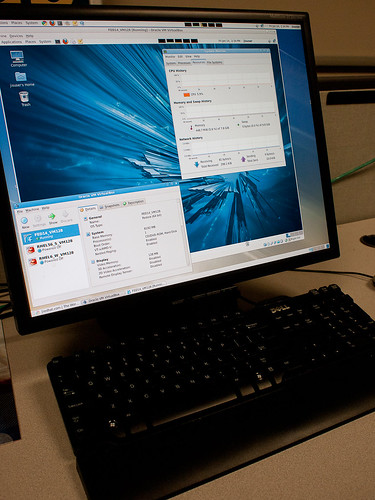At Work with Linux: RHEL 6 and VirtualBox 3.2.12
 |
| A Dell 690 with RHEL 6 as the host OS. Virtual Box 3.2.12 is running Fedora 14 in a virtual machine. |
What you're looking at on the left is a Fedora 14 VM running under Virtual Box 3.2.12 r68302. The host OS is RHEL 6 x86-64.
Absolutely everything works, especially USB device sharing between the host and the VM. Under RHEL 5.4, USB device sharing refused to work. I suspect that the older kernel that RHEL 5 was based on would not support that capability. RHEL 6's more up-to-date kernel allows that particular feature to function, and function flawlessly (so far).
To date I've installed and tested RHEL 6 Server, RHEL 5.6 Server, and Fedora 14 as Virtual Box VMs hosted on RHEL 6 Server. I can't tell from my limited testing if performance is better or worse, but I can't tell the difference between older versions of Virtual Box on older versions of RHEL and this current setup. Regardless, everything runs smooth as butter.
One other feature that moving up to RHEL 6 brings, and that's the ability to install (via RPM) and run Chrome, specifically version 8. Not only is everything in place on RHEL 6 to support error-free installation, but Chrome 8 on RHEL 6 updates itself just like it does under Windows. I no longer have to depend upon Redhat (or Fedora, for that matter) to release security updates; it comes directly from The Google. Now, if only Firefox 4, when it's released, will do the same.
No other issues to talk about. As a server and development platform (primarily Java EE, Mule ESB, and JBoss) it provides a trouble free platform. For a desktop, I'd rather stick with Windows, installed on hardware or as another VM.
The right tool for the right job.

Comments
Post a Comment
All comments are checked. Comment SPAM will be blocked and deleted.